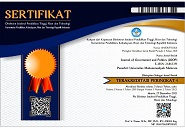Understanding Public Sctor Problems Affecting Uganda: A Depth Analysis of The Public Choice Theory
Abstract
This study aims to identify and analyze the major problems affecting the Ugandan public sector through the lens of public choice theory. The research addresses the economic, political, social, and technological challenges that force government institutions to seek new ways to improve public sector performance. Despite various reforms initiated over the past 25 years, corruption, inefficiency, and inadequate service delivery remain pervasive issues. Corruption affects resource allocation and hinders development, while inefficiency is linked to a lack of skilled personnel, outdated infrastructure, and bureaucratic red tape. Shortcomings in service delivery, particularly in health and education, contribute to public dissatisfaction.Methodologically, this study employs a qualitative analysis of existing literature and government reports to assess the effectiveness of anti-corruption measures, capacity-building initiatives, technology adoption, and bureaucratic streamlining. The analysis reveals that while efforts to enhance transparency through digital platforms and establish anti-corruption units have been made, the impact of these reforms has been limited. This limitation is attributed to implementation challenges and resistance to the application of private sector techniques in the public sector.The study concludes that sustained progress in the Ugandan public sector requires ongoing commitment, comprehensive institutional reforms, and active community engagement to ensure effective governance and improved service provision.
Keywords
Full Text:
PDFReferences
Amoako-Asiedu, E., Ohemeng, F. K. L., Obuobisa-Darko, T., & Parku, K. (2023). The persistence of organizational performance problems the public services in Ghana: The perspective of societal culture. International Journal of Cross Cultural Management, 23(2), 443–466. https://doi.org/10.1177/14705958231190825
Andersson Nystedt, T., Svensson, P., Herder, T., Asamoah, B. O., Ouis, P., & Agardh, A. (2023). Coming across a hidden problem in an excluded population in Sweden: professionals’ experiences of young migrants’ disclosures of sexual violence. Culture, Health and Sexuality, 0(0), 1–17. https://doi.org/10.1080/13691058.2023.2234431
Beniušis, V. (2023). Internal Communication Challenges and Their Solution When Hybrid Work is Implemented in a Public Sector Organization: The Case Study of the Ministry of Transport and Communications of the Republic of Lithuania. Information and Media, 95, 94–115. https://doi.org/10.15388/IM.2023.95.59
Carlton, S., & Vallance, S. (2023). Experimentation Within the Urban Ecosystem: The Case for Cross-Sector Support. Space and Culture. https://doi.org/10.1177/12063312231184344
Fevre, D. M. Le. (2020). Complex Challenges in Policy Implementation. 2019, 192–202.
Georgios, K., & Nikolaos, V. (2021). Reinstating greek e-governance: A framework for e-government benchmarking, improvement and government policies. In Вопросы государственного и …. cyberleninka.ru. https://cyberleninka.ru/article/n/reinstating-greek-e-governance-a-framework-for-e-government-benchmarking-improvement-and-government-policies
Goswami, Y., Agrawal, A., and Bhatia, A. (2020). E-governance: A tendering framework utilizing blockchain technology, with citizens actively involved. The year is 2020. The IEEE International ... The link provided is for the abstract of a document on the IEEE Xplore platform with the identifier 9342816.
Jiang, Z. (2022). Understanding Bureaucratic Involution through Weber’s Bureaucracy: China’s Central Inspection Teams in Practice. Modern China, 48(6), 1179–1207. https://doi.org/10.1177/00977004221118573
Jin, Y. (2021). Content governance mechanism of social e-commerce platform from the perspective of information ecology: A case study of Xiaohongshu. In Proceedings - 2nd International Conference on E-Commerce and Internet Technology, ECIT 2021 (pp. 159–162). https://doi.org/10.1109/ECIT52743.2021.00043
Manfredi-Sánchez, J. L., & Smith, N. R. (2023). Public diplomacy in an age of perpetual crisis: assessing the EU’s strategic narratives through six crises. Journal of Communication Management, 27(2), 241–258. https://doi.org/10.1108/JCOM-04-2022-0037
Mukuru, M., Kiwanuka, N., Gilson, L., Shung-king, M., & Ssengooba, F. (2021). “The Actor Is Policy”: Application of Elite Theory to Explore Actors’ Interests and Power Underlying Maternal Health Policies in Uganda, 2000-2015. Kerman University of Medical Sciences, 10(7), 388–401. https://doi.org/10.34172/ijhpm.2020.230
Newman, C., Nayebare, A., Neema, S., Agaba, A., & Akello, L. P. (2021). Uganda’s response to sexual harassment in the public health sector: from “Dying Silently” to gender-transformational HRH policy. Human Resources for Health, 19(1), 1–19. https://doi.org/10.1186/s12960-021-00569-0
Nguyễn, D. T., and Miyazaki, T. (2023). Strategic collaboration between Japanese municipalities about the remuneration levels of public servants. The citation is from the Annals of Regional Science, volume 71, issue 2, pages 463-485. The provided link is a DOI (Digital Object Identifier) for a scholarly article. The article can be accessed by following the link.
Rossidis, I., & Belias, D. (2021). Evolution of e-Governance in the Era of the Pandemic. Will the Crisis Become an Opportunity? The Cases of Cyprus and Greece. Cyprus Review. https://cyprusreview.org/index.php/cr/article/view/775
Sharma, S., Kadayat, Y., & Tyagi, R. (2023). Sustainable Global Democratic e-Governance System Using Vedic Scripture, Artificial Intelligence, Cloud Computing and Augmented Reality. 2023 International Conference …. https://ieeexplore.ieee.org/abstract/document/10245405/
Shukla, P. S., & Mathur, M. (2020). Conceptualizing the role of data analytics and technology in e-governance: An insight. International Journal of Business Analytics …. https://www.igi-global.com/article/conceptualizing-the-role-of-data-analytics-and-technology-in-e-governance/246025
Suri, P. K. (2022). Effectiveness of strategy implementation and e-governance performance. Evaluation and Program Planning. https://www.sciencedirect.com/science/article/pii/S0149718922000179
Van Opstal, W., and Smeets, A. (2022). Market-specific obstacles and facilitators for organizational in-vestments in solar photovoltaic (PV) systems - Insights from the region of Flanders. The citation is from the journal Sustainability, specifically volume 14, issue 20, published in Switzerland. The provided link is a DOI (Digital Object Identifier) for an article. The article can be accessed by clicking on the link.
Witter, S., Bertone, M. P., Chirwa, Y., Namakula, J., So, S., & Wurie, H. R. (2017). Evolution of policies on human resources for health: opportunities and constraints in four post-conflict and post-crisis settings. Conflict and Health, 10(1), 1–18. https://doi.org/10.1186/s13031-016-0099-0
DOI: https://doi.org/10.31764/jgop.v6i1.24438
Copyright (c) 2024 GLORIA NAMBASSA
This publication is indexed by:





.png)










1.JPG)